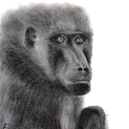Collective decision-making in baboons (previous work)

To stay together, animal groups on the move must come to a consensus about where and when to go, despite the fact that individual preferences may often conflict. Resolving these conflicts effectively is essential for animals that live in stable, socially-complex societies, such as baboons. How are these movement decisions reached?
To address this question, my collaborators (including Meg Crofoot, Damien Farine, and Iain Couzin) and I used GPS tracking data on the movements of the majority of baboons within a single troop, a 3-dimensional map of their environment, and quantitative analyses to tease apart the different influences on baboon movement.
Above is an example of baboon collective movement. Each dot represents a single baboon within the troop.
Key topics:
-
Consensus decision-making
How shared or unshared are baboons' decisions about where to move?
Read the paper: Shared decision-making drives collective movement in wild baboons
Read an article about the research: Baboon-Trackers Herald New Age of Animal Behaviour Research
-
Group spatial organization
Do individuals occupy particular spatial positions within the group, and if so how do they maintain those positions?
Read the paper: Individual variation in local interaction rules can explain emergent patterns of spatial organization in wild baboons.
-
Habitat influences on collective movement
How do individual baboons integrate habitat and social information when making movement decisions?
How does habitat structure affect group structure and movement at the collective level?
Read the paper: Habitat and social factors shape individual decisions and emergent group structure during baboon collective movement
Read an article about the research: Habitat features and social behavior impact how baboons move as a group
Habitat flyover
Visualization of 3-dimensional (point cloud) reconstruction the baboons' habitat
Combining GPS tracks and habitat data
Visualization of baboon movement data overlaid on 3-dimensional habitat reconstruction







